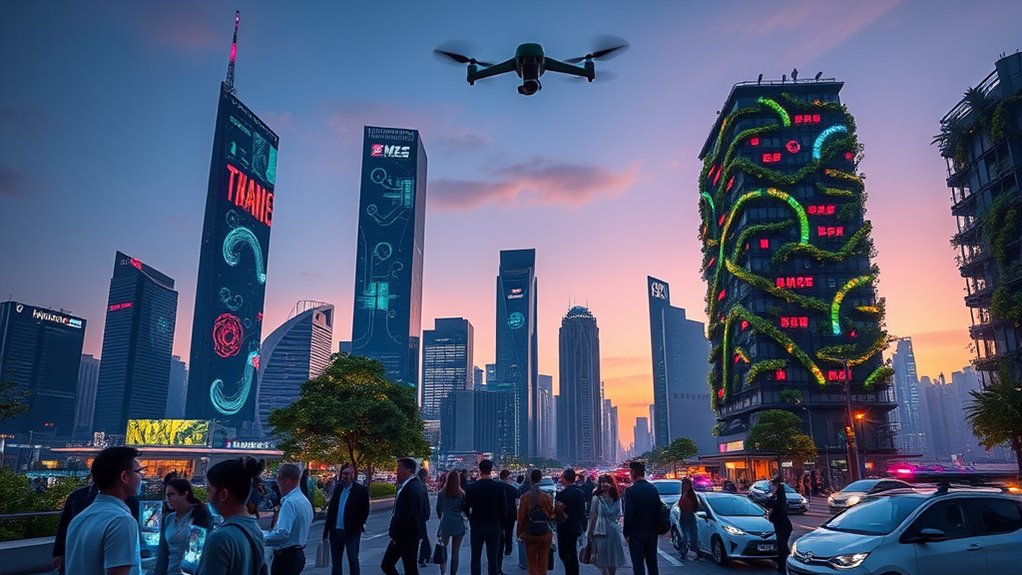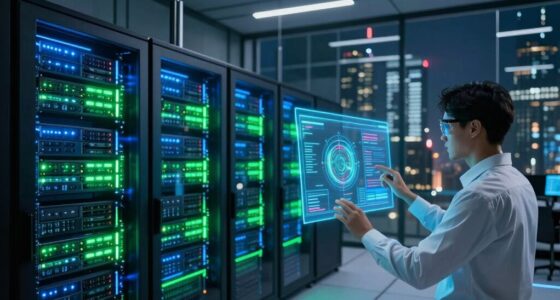By 2026, generative AI will transform your daily life and work. You’ll rely on virtual assistants to manage your schedule and create customized designs, boosting your productivity and creativity. However, ethical considerations like ownership and privacy will become essential. As automation reshapes job roles, you’ll need to adapt with new skills focused on human-AI collaboration. Future advancements hold the promise of improving your life while ensuring ethical standards are met, and there’s much more to explore ahead.
Key Takeaways
- By 2026, generative AI will be integrated into daily life, enhancing productivity through virtual assistants managing routines and creative tasks.
- The rise of AI-generated content will raise complex ethical issues regarding ownership, privacy, and authenticity that need to be addressed.
- Automation driven by AI will evolve job roles, potentially displacing some functions while creating demand for new skills in human-AI collaboration.
- Responsible development and regulation of AI will be crucial to ensure ethical usage and prevent potential misuse and societal harm.
- The future landscape will emphasize creativity and problem-solving skills that AI cannot replicate, reshaping workforce dynamics and economic models.

How will generative AI transform our lives by 2026? You might be surprised by how deeply it’s set to change everyday experiences, from the way you work to how you create. As generative AI technologies advance, they’ll become more integrated into various aspects of your life, streamlining tasks and enhancing creativity. Imagine having a virtual assistant that not only manages your schedule but also produces reports and designs tailored to your needs. This shift could redefine productivity and innovation.
Yet, with these advancements come significant ethical implications. You may find yourself grappling with questions around ownership, privacy, and the authenticity of content. If AI-generated art or writing becomes indistinguishable from human creations, who owns the rights? As generative AI creates, it raises concerns about plagiarism, consent, and the potential for misuse. By 2026, these questions will be front and center, forcing you to contemplate the ethical framework surrounding AI technologies. You’ll need to discern the fine line between collaboration with AI and dependency on it, making certain that creativity remains an inherently human endeavor.
Moreover, generative AI will have profound economic impacts that could reshape job markets. You might notice certain roles evolving or even disappearing as automation takes over repetitive tasks. While this could lead to increased efficiency and lower costs in various industries, it might also create anxiety about job security. By 2026, many of you will likely need to adapt to this changing landscape, learning new skills to remain competitive. The economic shifts could spur a demand for jobs that focus on human-AI collaboration, emphasizing creativity and problem-solving skills that AI can’t replicate.
As you navigate this transforming world, it’ll be essential to advocate for responsible AI development. Engaging in conversations about ethical guidelines and regulations will help guarantee that these technologies benefit society as a whole. By staying informed and involved, you’ll play a crucial role in shaping a future where generative AI enhances lives without compromising ethical standards.
Frequently Asked Questions
What Are the Ethical Concerns Surrounding Generative AI?
You’ve probably heard whispers of Pandora’s box when it comes to generative AI. The ethical concerns are real. Bias concerns can lead to unfair outcomes, as algorithms often reflect the prejudices in their training data. Then there are privacy risks—your data might be used without your consent, raising questions about ownership and trust. As you navigate this landscape, it’s essential to stay informed and advocate for responsible practices in AI development.
How Will Generative AI Impact Job Markets by 2026?
By 2026, generative AI will crucially impact job markets through automation displacement and skill transformation. You might find that many routine tasks get automated, leading to job losses in certain sectors. However, new roles will emerge, requiring you to adapt and learn new skills. As industries evolve, embracing this change and upskilling will be significantly for staying competitive. It’s essential to focus on creativity and critical thinking, which AI can’t replicate.
What Industries Will Benefit Most From Generative AI Advancements?
The industries that’ll benefit most from generative AI advancements include marketing, entertainment, and healthcare. In marketing, you’ll see creative automation enhancing ad campaigns, while in entertainment, it’ll revolutionize content creation. Healthcare will utilize data synthesis for personalized treatment plans. As you embrace these changes, you’ll find that generative AI not only streamlines processes but also sparks innovation across various sectors, ultimately transforming how you work and interact with technology.
How Can Businesses Integrate Generative AI Into Their Operations?
To seamlessly integrate generative AI into your operations, start with strategic steps. Prioritize AI-driven personalization to enhance customer experiences, ensuring each interaction feels tailored. Next, embrace automated content creation to streamline marketing and communication efforts, boosting efficiency. By blending these approaches, you’ll not only improve productivity but also foster innovation. Don’t hesitate to experiment and adapt, as the landscape constantly evolves, and your business can thrive by harnessing these powerful tools.
What Regulations Are Expected for Generative AI in the Future?
You can expect regulations for generative AI to focus on intellectual property rights and compliance with international treaties. As governments and organizations adapt to evolving technology, they’ll likely establish guidelines to safeguard creators while promoting innovation. You’ll see increased scrutiny on data usage, transparency, and ethical considerations. Staying informed about these regulations will help you navigate the landscape and ensure your business aligns with legal requirements and industry standards.
Conclusion
As the clock ticks toward 2026, generative AI isn’t just a tool; it’s a paintbrush, ready to color our world with innovation and creativity. It’ll redefine how we work, create, and connect, weaving technology into the very fabric of our daily lives. Embrace this transformation, because in the domain of AI, the possibilities are as limitless as the stars. Your journey alongside this evolution can spark waves of change, igniting a future that’s brighter than ever.









